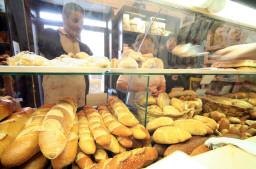The Italian government has been urged to curb inflation and help struggling families after prices hit a new 12-year high in July.
The calls came after the year-on-year inflation rate hit 4.1%, its highest since June 1996, according to preliminary figures issued on Thursday.
It was the second straight 12-year high after June's rate of 3.8%.
Aggravating inflation again this month were the soaring costs of pasta and bread along with runaway prices for fuels plus higher tourism costs.
Pasta prices were up 25% on July 2007, the third straight month they rose by more than 20%.
Bread cost 13% more, the same rise as May and June.
Energy prices in general rose 16.6% over July of last year, compared to a 14.7% hike in June.
Diesel was 31.4% dearer than July 2007 after rising 31.1% in June while petrol prices were 12.5% up for the year.
The new high spurred the centre-left opposition to call on Silvio Berlusconi's centre-right government to change economic tack.
The Democratic Party called for measures to safeguard the purchasing power of wages and pensions to be inserted into the budget set for approval in parliament.
It accused the government of doing ''nothing'' to help the worst-off.
The government has denied these charges, pointing to a new pre-paid card for the poor.
The card will enable some 1.2 million Italians a special to buy food and pay for utilities at a discount.
CONSUMERS, FARMERS ALARMED.
Consumer and farming groups voiced concern over the new inflation figures.
Consumer protection group Codacons said the trend would mean an extra bill of 1,700 euros for every Italian household at the end of the year.
It urged the government to take action on fuel and food costs ''to save thousands of families from the risk of bankruptcy''.
''The government must act, immediately blocking energy bills for households and firms, cutting duties on fuels and punishing speculation at the pump,'' it said.
Other consumer groups called for ''stringent'' action to curb price speculation that had one in four families facing ''a crisis''.
They said inflation was already taking a 35% bite out of salaries and put extra spending by the end of the year at between 1,500 and 1,800 euros.
Codacons also called for new food pricing labels showing the prices of products at all three stages: production, wholesale and retail.
Farmers association CIA advocated a two-tier approach, calling for the publication of prices when food products leave the farm and when they reach consumers.
It called the latest food figures ''alarming'' and stressed that there was ''an urgent need to intervene as soon as possible''.
It said recent price hikes had led 60% of households to change their eating habits.
The only foods showing a rise in consumption in the first quarter were pasta, milk and chicken, with families cutting back elsewhere, it said.
Italians were now buying most of their food in discount hypermarkets although there were some signs of consumers buying straight from farms, it said.
The farmers' warning on eating trends came after several studies indicating Italians are being forced to abandon the classic Mediterranean diet for poorer fare.
ANTI-TRUST TO WATCH MILK AS WELL AS BREAD AND PASTA.
Meanwhile the Italian Anti-Trust Authority said it would start monitoring milk prices as well as its existing controls on the movements of bread and pasta prices.
Its action has so far resulted in a fine for Rome's main bread-making association.
Also on Thursday, retail association Confcommercio said the inflation data confirmed a steady upward trend.
It said it could not see prices coming down any time soon.
The data issued by national statistics bureau Istat Thursday were based on preliminary estimates from sample cities across Italy.
The definitive inflation figures, which are usually very close to the estimates, will be issued in mid-August.
Inflation in the eurozone rose to 4.1% in July from 4% in June and 3.8% in May, Eurstat said Thursday.









